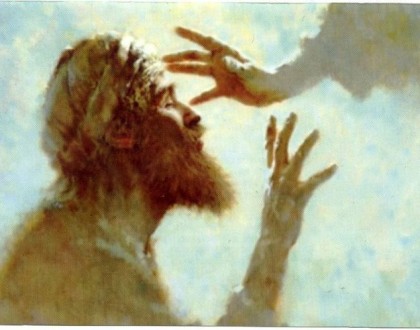June 21st 2015 – 12th Sunday in Ordinary Time (Year B).

June 21st 2015 – 12th Sunday in Ordinary Time (Year B).
Job 38:1, 8-11, Psalm 106, 2 Cor 5:14-17, Mark 4:35-41
If you are a parent or grandparent you will have heard of the movie Frozen and it’s famous song “Let it go”. It’s a catchy song and with a pretty straight-forward message…except maybe for the line; “No right, no wrong, no rules for me I am free!”, but to be fair to the film its message is good over all. But one of the lines from the film can be understood in the light of this week’s Gospel reading about the storm on the Sea of Galilee. Anna confronts Elsa about the consequence of her acts and the icy desolation she has left in her wake. Elsa tries to ignore the deadly consequences of her desertion by telling her sister; “I am alone but alone and free. Stay away and you’ll be safe from me.” Anna responds; “Actually we’re not.” She means they are not safe but she could also mean easily mean “and you’re not safe either.” At this point, Elsa’s initial elation over her “freedom” fades and she angrily laments, “I’m such a fool I can’t be free. No escape from the storm inside!” The calming of the waters and this calming of our inner storms are a constant theme in Scripture and today’s Gospel and readings bring it to the fore.
There are many biblical passages that reveal the imagery of the angry sea. The Lord redeems his people from slavery in Egypt by turning the sea against the Egyptians [Exodus 15:8]. Other times the roaring waves of the sea are tamed only after fierce struggles [Ps 89, Isa 51:9-10]. The sea mythology of the Old Testament underlies the first reading, psalm and Gospel for the Twelfth Sunday in Ordinary Time [year B]. In the Scriptures, the sea becomes a hostile, angry, dangerous area.
The question of Job is one asked by humanity throughout the ages: “Why do good, innocent people suffer?” Throughout the book, Job has been asking God to justify his actions, and God’s response forms the key section of the whole book. Chapter 38 begins the next to the final section in this book, in which God finally answers the ultimatums hurled at the divine throne. God responds by firing questions at Job about creation, implying that Job cannot explain his suffering because God’s response basically challenges Job’s right to question the Almighty!
Sunday’s small excerpt from the magnificent speech of God surrounds the Lord with the most awesome imagery. The Lord addressed Job out of the whirlwind and questioned him about the control of the ocean waves. “Where were you when I laid the foundation of the earth? Tell me, if you have understanding [Job 38:4]. “Or who shut in the sea with doors when it burst out from the womb? [Job 38:8] The implied question is: If Job cannot understand God’s providence for the sea and the powers of nature, how will he ever grasp divine care for humans?
In the New Testament, the sea almost always represents a moment of conversion. It is along the sea that Jesus calls others to join him in his prophetic ministry and outreach to the poor and the sick. A sudden squall on the Sea of Galilee provides the crisis in Sunday’s Gospel story [Mark 4:35-41] that takes place after a full day of teaching for Jesus. The calming of the storm is also a great teaching moment for Jesus. When the disciples awake him, they address him “Teacher”.
Throughout the entire storm at sea, Mark insists on Jesus’ calmness and rootedness in God. He is “in the stern, asleep on the cushion”[Mk 4:38], trusting in God, in contrast to the disciples, who are frightened. When they rebuke Jesus for sleeping, he rebukes them for their lack of faith. In Mark’s account, both the disciples’ words to Jesus and his responses to them are quite harsh. Matthew and Luke soften both statements but here the disciples really rebuke Jesus– and his rebuke to them doesn’t merely speak of “little faith” but of “no faith”.
The calming of the storm reveals much to us, for as the first reading from Job has indicated, only God can control the wind and sea. Jesus does much more than quiet the storm waves roaring across the sea and tossing the boat from side to side or tipping it dangerously into the waters. Jesus shares God’s control of the seas, emerging as the new creator, bringing peace and order out of the primordial chaos and establishing himself as Ruler over the new kingdom of Israel.
Besides indicating Christ’s divine power over nature, the calming of the story suggests his power over evil–for the sea commonly symbolizes evil and chaos. The boat is already a symbol of the Church, so the story also challenges us to trust in Christ’s power so that we can persevere through the storms that assail us as individuals and as a church. Mark writes to his own community, which experiences chaos in the Lord’s absence. It’s almost as if the Lord is sleeping– uninvolved. Jesus challenges this lack of faith and affirms his continuing presence with power.
On the sea nothing happens normally, but always in abrupt or marvellous or very difficult ways. These are moments of decision with far-reaching consequences, in which the circumstances and even the timing are not in our control. The biblical passages of Jesus on the Sea of Galilee, especially the calming of the storm, can help us in recognizing such moments in our own lives and in guiding us through them.
A boat was a common symbol for the Church– here it is a symbol of a storm-tossed community crying out for help. Christ seems asleep and unconcerned, but he is in total control of the situation. The statement of peace recalls the greeting of the risen Christ. With Christ we pass through the raging sea and already share in his calm strength– even though like Job our questions may remain unanswered.
This Sunday’s readings clearly show that power must ultimately take the form of love and self-sacrifice. Who are the holders of power in our day-to-day experience? Power resides with parents, teachers, elected officials, Church leaders, and many others. The measure of genuine power is found in self-sacrifice. Parents give all for their children; teachers labour long hours for their students; pastors gladly spend themselves for their communities. The result of all this is new life for both the leader and the follower. Jesus gave his life in history’s ultimate display of power and service. His life, especially in the midst of the storms, teaches us how to live in the midst of the storms of our own lives and times.
How is our Church storm-tossed today, and by what signs do we know that Jesus is fully in control of the situation?
This week, let us take some time to reflect on the following questions that flow from our Scripture texts for the day: What are my deepest fears? How have I experienced God bringing order out of the chaos of my life? How is our Church storm-tossed today, and by what signs do we know that Jesus is fully in control of the situation?
Recent Sermons

Easter Sunday – The Resurrection
April 14, 2017

4th Sunday of Lent Year A – The Man Born Blind
March 27, 2017

3rd Sunday of Lent Year A – The Samaritan Woman at the Well
March 20, 2017





